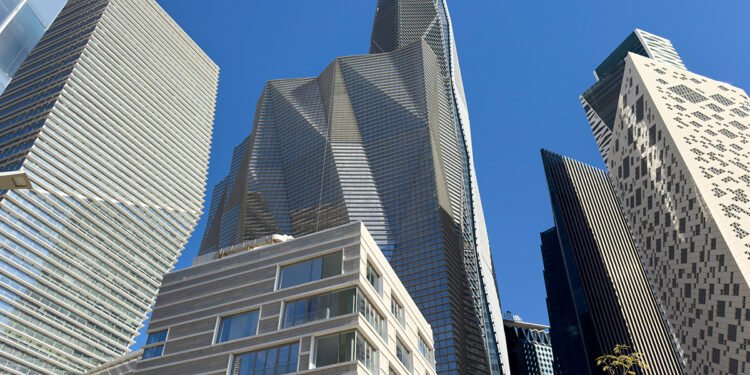The kingdom’s push to diversify its economy away from oil has seen a flurry of regulatory reforms aimed at attracting international investors, with the real estate sector emerging as a key beneficiary of these policy shifts.
According to data from the Ministry of Justice, cited by Imad Damrah, Managing Director at Colliers in Saudi Arabia, a total of 93,000 real estate transactions have been recorded in the kingdom in the first quarter of 2025.
Saudi Arabia’s General Authority for Statistic’s Real Estate Price Index rose by 3.6 per cent year-on-year in Q4 2024, with commercial and residential segments both seeing strong gains, according to Damrah. This coincides with the continued enforcement of the kingdom’s regional HQ mandate, which requires multinational companies to establish their Middle East headquarters in Saudi Arabia or risk losing access to lucrative government contracts.
Premium Residency driving luxury market
A significant driver of this growth has been the Saudi Premium Residency programme, which by late 2024 had attracted more than 1,200 international investors, according to information from the Minister of Investment shared by Damrah.
The programme, which offers various tiers of long-term residency rights, includes a “Real Estate Owner Residency” category that permits holders to own freehold or usufruct interests in residential property valued at a minimum of SAR4 million (approximately $1.07 million).
“Developers are launching high-end residential offerings with pricing above the minimum price threshold of SAR4 million for premium residency, in anticipation of demand from globally mobile, high-net-worth individuals,” Damrah noted, adding that the programme is already “shaping buyer demographics, particularly in Riyadh and Jeddah.”
Khaled Zowayed, a Partner at law firm Baker Mckenzie, confirmed that the programme offers substantial property rights to foreign investors. “For Makkah and Madinah, no freehold ownership is permitted even with the residency, but 99-year usufructs are permitted,” he explained.

Regulatory changes open holy cities to investment
One of the most significant recent policy shifts has been the relaxation of rules governing foreign investment in companies that own real estate in the holy cities of Makkah and Madinah.
“A Royal Decree dated 17/9/1442 (corresponding to 29/04/2021) amended part of the Foreign Ownership of Real Estate Law to specifically exclude listed companies from the definition of Non-Saudi, subject to guidelines to be issued by the Capital Market Authority,” Zowayed said.
Following the issuance of these guidelines, foreigners are now permitted to own shares in listed companies that own real estate in Makkah and Madinah, although foreign ownership is restricted to up to 49 per cent of any listed company.
Damrah described the sentiment around this policy shift as “optimistic,” noting that as “pilgrimage numbers in these cities continue to rise over the long term, this growth creates more opportunities for investment in hospitality and retail development.”
Despite the strong growth, the Saudi government is implementing measures to ensure sustainable development in the sector. Damrah noted that authorities are “taking steps to stabilise growth through land supply expansion, white land taxes and the possibility of implementing lease caps.”
These initiatives, he said, “aim to foster sustainable, long-term growth in the real estate sector while safeguarding consumers from the effects of escalating prices.”
Pathways to foreign ownership in Saudi Arabia
Zowayed pointed out that there are numerous existing avenues for foreign investment in Saudi real estate, including:
- Foreign licensed businesses owning their place of business
- Residents owning their private residences
- Investment and development of real estate worth at least SAR30 million (land & construction) provided the investment is completed within 5 years
- Investing in a Capital Market Authority-licensed real estate fund that owns real estate
- Investing in a Tadawul-listed company that owns real estate
- Special privilege iqama holders owning property worth at least SAR4 million
- GCC nationals, who are not considered foreigners under Saudi law, generally being permitted to own real estate, except in Makkah and Madinah

Market opportunities and future outlook
Both experts highlighted significant opportunities in specific market segments. Damrah pointed to “strong potential in the mid-income executive housing segment, which remains relatively untapped compared to the abundance of luxury or subsidised affordable housing from government projects.”
He also noted similar opportunities in the office market, “where premium spaces dominate, yet demand from SMEs for quality, cost-effective options continues to grow.”
The hospitality sector was identified as particularly promising, especially with upcoming mega-events. “Hospitality is a promising sector, especially with the upcoming Expo 2030 and World Cup 2034,” Damrah said.
He emphasised that a critical strength of the Saudi real estate market is its “strong organic demand, driven by population growth and shifting demographics,” which adds “resilience and long-term stability, making the market less susceptible to global volatility.”
Mega-events FIFA 2034, Expo 2030 boosting investor confidence
Saudi Arabia’s securing of major global events has significantly boosted investor confidence in the real estate sector. “Global visibility is rising with the Kingdom securing major global events such as the FIFA World Cup 2034, Expo 2030 and the Asian Games 2034,” Damrah noted.
These events, combined with progress on innovative giga-projects like Qiddiyah and a surge in tourism, are driving demand across multiple real estate sectors, including hospitality, retail, and residential.
For investors looking to enter the market, Damrah advised focusing on “identifying underserved segments such as SME-grade office spaces or mid-income housing and aligning with long-term macro trends shaping the Kingdom’s evolving urban landscape.”
As Saudi Arabia continues its economic transformation under Vision 2030, the real estate sector appears poised for continued growth, with foreign investment playing an increasingly important role in this development.









